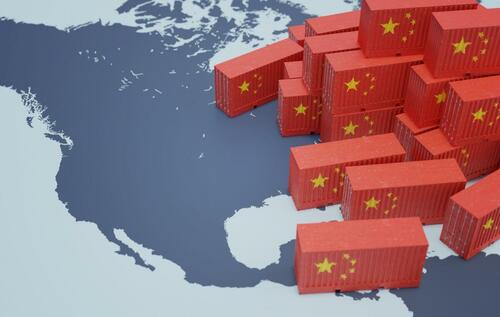
Authored by Gordon Chang via The Gatestone Institute,
"I can't believe how many people are negative on tariffs that are actually smart people," President Donald Trump told Bloomberg in a June 25 interview.
"Economically, they're phenomenal."
Since then, a lot of smart people have rushed to the American media to say that, on the contrary, high tariffs are horrible.
Trump is right. Although these levies would increase costs to American consumers, the costs would not be nearly as great as experts say. Moreover, there are other considerations, both economic and national security, favoring raising tariffs now.
"As president, Trump shattered the long-standing Republican orthodoxy of favoring free trade," Bloomberg noted in commentary accompanying the interview, released on July 16th: "He says he'll go further if reelected." Trump talked about increasing tariffs on, among others, China.
Trump happens to be right about China. In February, speaking to Maria Bartiromo on Fox News' Sunday Morning Futures, he suggested he might impose tariffs greater than 60% on Chinese imports.
Critics from the American elite howl. "This is going to add price inflation across the board, all in the name of 'tough guy' election-year politics," said Yael Ossowski of the Consumer Choice Center, in comments carried by Bloomberg.
"The long historical record demonstrates these are borne not by other countries, as Mr. Trump keeps insisting, but by American consumers and industries," writes Steven R. Weisman of the Washington, D.C.-based Peterson Institute for International Economics, about tariffs.
The long historical record might show that, but not the immediate one. In 2018, Trump imposed additional tariffs on China and analysts warned that prices in America would rise. Smart people in America, however, forgot that China had an incentive to effectively pay the tariffs: The Chinese government and exporters absorbed 75% to 81% of the cost of the additional levies. They did so primarily through the government increasing export and other subsidies and factories accepting lower profit margins.
"The Trump tariffs were barely noticed by U.S. businesses or consumers," long-time trade expert Alan Tonelson told Gatestone. "They certainly did not raise inflation, and they certainly did not cut growth."
Trump's additional tariffs topped out at 25%. Now, he is proposing even higher levies. The hit to the American consumer will undoubtedly be greater this time. "The higher tariffs are raised from current levels, the more likely disruptions will occur," says Tonelson, also the founder of public policy blog RealityChek.
At the same time, however, the Chinese have even greater reason to shield consumers from increased costs. The problem for Xi Jinping is that China's growth model is exhausted, and after rejecting stimulating domestic consumption, he is entirely dependent on increasing exports.
Chinese factories, from all indications, are struggling and need to keep customers. For instance, China's Producer Price Index, which measures factory-gate prices, declined for the 21st consecutive month in June. The Wall Street Journal reports low prices have pushed many factories in China "to the brink." With prices declining in China, American consumers will not feel the pinch of new tariffs.
Furthermore, there is one more reason why U.S. consumers will not suffer. High American tariffs will encourage factories to move out of China. When they do, any pressure on consumer prices will disappear.
This is a contest that the United States cannot lose.
In short, trade-surplus countries, such as China, cannot prevail over trade-deficit ones, such as America.
Last year, America's merchandise trade deficit with China was $279.4 billion.
That is why, ultimately, China will have to pay the cost of tariffs that Trump — or any other American leader — may impose. Clearly, China's regime knows this. People's Daily, the Communist Party's self-described mouthpiece and therefore the most authoritative publication in China, this month is arguing that America should not raise tariffs.
Yet even if American consumers were to pay more because of the tariffs, let us remember why they were imposed in the first place. Trump in 2018 invoked Section 301 of the Trade Act of 1974 and raised tariffs as a remedy for Chinese theft of U.S. intellectual property. China steals each year somewhere in the neighborhood of a half trillion dollars of American intellectual property. Critics of tariffs, whether they make valid points or not about increased costs, have an obligation to say how they would eliminate or reduce this criminal practice through other means.
On a broader point, Americans, after more than four decades of misguided policy, have to realize that they cannot fix their lopsided trade relations with China without bearing pain. Unless they agree to become subservient to the militant Chinese state, they will have to accept the costs of remaining sovereign.
Trump's 60% tariffs would "drastically slow" the Chinese economy, as Fortune reported this month. The hit to China would be far greater than any collateral effects in America. Experience with the 2018 tariffs is a guide. "Overall, the damage to China's gross domestic product from the trade war was three times as high as the hit to the U.S., according to some Chinese economists," the Wall Street Journal reported in May.
Why should Americans want to decimate the Chinese factory sector? The Communist Party of China sees the U.S. as an enemy and seeks the destruction of the American republic. The struggle, in short, is existential. China's regime cannot wage the fight against America without American money.
So why should Americans supply the cash to their enemy?
Authored by Gordon Chang via The Gatestone Institute,
“I can’t believe how many people are negative on tariffs that are actually smart people,” President Donald Trump told Bloomberg in a June 25 interview.
“Economically, they’re phenomenal.”
Since then, a lot of smart people have rushed to the American media to say that, on the contrary, high tariffs are horrible.
Trump is right. Although these levies would increase costs to American consumers, the costs would not be nearly as great as experts say. Moreover, there are other considerations, both economic and national security, favoring raising tariffs now.
“As president, Trump shattered the long-standing Republican orthodoxy of favoring free trade,” Bloomberg noted in commentary accompanying the interview, released on July 16th: “He says he’ll go further if reelected.” Trump talked about increasing tariffs on, among others, China.
Trump happens to be right about China. In February, speaking to Maria Bartiromo on Fox News’ Sunday Morning Futures, he suggested he might impose tariffs greater than 60% on Chinese imports.
Critics from the American elite howl. “This is going to add price inflation across the board, all in the name of ‘tough guy’ election-year politics,” said Yael Ossowski of the Consumer Choice Center, in comments carried by Bloomberg.
“The long historical record demonstrates these are borne not by other countries, as Mr. Trump keeps insisting, but by American consumers and industries,” writes Steven R. Weisman of the Washington, D.C.-based Peterson Institute for International Economics, about tariffs.
The long historical record might show that, but not the immediate one. In 2018, Trump imposed additional tariffs on China and analysts warned that prices in America would rise. Smart people in America, however, forgot that China had an incentive to effectively pay the tariffs: The Chinese government and exporters absorbed 75% to 81% of the cost of the additional levies. They did so primarily through the government increasing export and other subsidies and factories accepting lower profit margins.
“The Trump tariffs were barely noticed by U.S. businesses or consumers,” long-time trade expert Alan Tonelson told Gatestone. “They certainly did not raise inflation, and they certainly did not cut growth.”
Trump’s additional tariffs topped out at 25%. Now, he is proposing even higher levies. The hit to the American consumer will undoubtedly be greater this time. “The higher tariffs are raised from current levels, the more likely disruptions will occur,” says Tonelson, also the founder of public policy blog RealityChek.
At the same time, however, the Chinese have even greater reason to shield consumers from increased costs. The problem for Xi Jinping is that China’s growth model is exhausted, and after rejecting stimulating domestic consumption, he is entirely dependent on increasing exports.
Chinese factories, from all indications, are struggling and need to keep customers. For instance, China’s Producer Price Index, which measures factory-gate prices, declined for the 21st consecutive month in June. The Wall Street Journal reports low prices have pushed many factories in China “to the brink.” With prices declining in China, American consumers will not feel the pinch of new tariffs.
Furthermore, there is one more reason why U.S. consumers will not suffer. High American tariffs will encourage factories to move out of China. When they do, any pressure on consumer prices will disappear.
This is a contest that the United States cannot lose.
In short, trade-surplus countries, such as China, cannot prevail over trade-deficit ones, such as America.
Last year, America’s merchandise trade deficit with China was $279.4 billion.
That is why, ultimately, China will have to pay the cost of tariffs that Trump — or any other American leader — may impose. Clearly, China’s regime knows this. People’s Daily, the Communist Party’s self-described mouthpiece and therefore the most authoritative publication in China, this month is arguing that America should not raise tariffs.
Yet even if American consumers were to pay more because of the tariffs, let us remember why they were imposed in the first place. Trump in 2018 invoked Section 301 of the Trade Act of 1974 and raised tariffs as a remedy for Chinese theft of U.S. intellectual property. China steals each year somewhere in the neighborhood of a half trillion dollars of American intellectual property. Critics of tariffs, whether they make valid points or not about increased costs, have an obligation to say how they would eliminate or reduce this criminal practice through other means.
On a broader point, Americans, after more than four decades of misguided policy, have to realize that they cannot fix their lopsided trade relations with China without bearing pain. Unless they agree to become subservient to the militant Chinese state, they will have to accept the costs of remaining sovereign.
Trump’s 60% tariffs would “drastically slow” the Chinese economy, as Fortune reported this month. The hit to China would be far greater than any collateral effects in America. Experience with the 2018 tariffs is a guide. “Overall, the damage to China’s gross domestic product from the trade war was three times as high as the hit to the U.S., according to some Chinese economists,” the Wall Street Journal reported in May.
Why should Americans want to decimate the Chinese factory sector? The Communist Party of China sees the U.S. as an enemy and seeks the destruction of the American republic. The struggle, in short, is existential. China’s regime cannot wage the fight against America without American money.
So why should Americans supply the cash to their enemy?
Loading…





